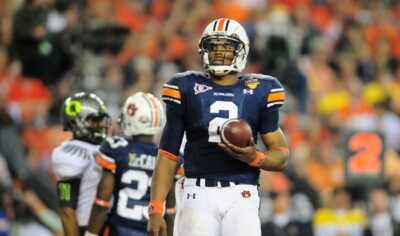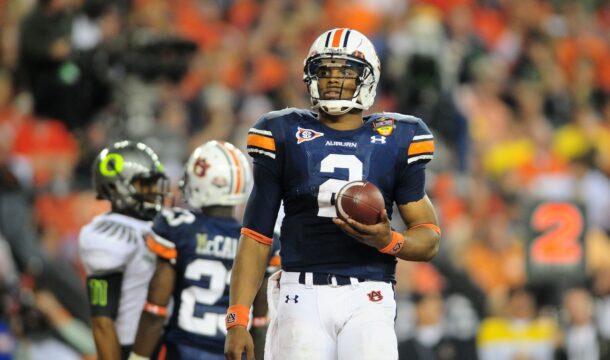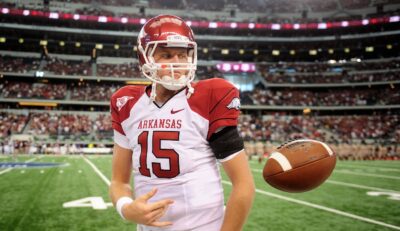
Taking a position-by-position look at Tennessee vs. Northwestern, here’s what to watch for in the Outback Bowl showdown between the Volunteers and the Wildcats.
QUARTERBACK — Tennessee: Joshua Dobbs is Tennessee’s most valuable offensive player. His dual-threat ability allows Tennessee’s offense to be successful. Dobbs finished the regular season with 2,125 passing yards, 15 TDs and five INTs. He also added another 623 yards on the ground, plus nine more scores.
On the other hand, Northwestern tended to keep things simple for its redshirt freshman Clayton Thorson, who completed just 51.7 percent of his passing attempts. However, Thorson does have the ability to run the football — rushing for five TDs this season — and he has a knack for making big plays in key moments.
RUNNING BACK — Tennessee: Sophomores Jalen Hurd and Alvin Kamara made up one of the nation’s most productive backfield tandems this season. They combined for more than 2,200 yards of total offense. Hurd led the way with 1,158 rushing yards and 11 TDs, along with 190 receiving yards and two TD receptions. Kamara added 645 yards and six TDs on the ground.
Northwestern doesn’t have the dynamic duo that Tennessee has, but sophomore workhorse Justin Jackson was the Wildcats’ best offensive weapon with 1,344 rushing yards on a Big Ten-leading 298 carries.
WIDE RECEIVERS, TIGHT END — Tennessee: Both Tennessee and Northwestern struggled with their passing games this season. The Vols’ lack of a passing attack hurt them significantly in losses to Oklahoma and Florida. But Tennessee might have the best group of blocking receivers in college football, which is why the Vols get the nod here.
Northwestern’s offense relies heavily on the success of Jackson running the football. But in the Wildcats’ games against elite run defenses in Michigan and Iowa, Jackson struggled with the rest of the offense. In those two games, Northwestern’s offense managed only 10 points. But the Wildcats have versatile FB/TE Dan Vitale, who leads the Wildcats in receptions (33), receiving yards (355) and TDs (four). It will be a challenge for Tennessee to cover him.
OFFENSIVE LINE — Tennessee: Tennessee’s line paved the way for one of the SEC’s best rushing attacks — the Vols ranked second in the conference with 223.5 rushing yards per game. In Tennessee’s final two games of the season against Missouri and Vanderbilt — games that sophomore guard Jashon Robertson was fully healthy — the Vols rushed for 572 total yards and didn’t give up a sack.
Northwestern’s line suffered significant injuries throughout the season and was ineffective. The Wildcats rotated through eight different combinations. Northwestern finished 87th in the nation in adjusted sack rate, but Jackson’s ability to run the football helped cover up some of the weaknesses.
DEFENSIVE LINE — Northwestern: Tennessee will have the most-talented defensive lineman on the field in Derek Barnett, but Northwestern’s group played better than Tennessee’s this season.
For the majority of the Wildcats’ games, ends Dean Lowry and Deonte Gibson set the tone for Northwestern’s stout defense. Lowry didn’t have great statistics — only three sacks this season — but he applied consistent QB pressure in wins against Duke and Nebraska. Gibson had nine sacks this season.
Tennessee’s line only had one good game against a quality offense — accumulating five sacks against Alabama — and most of its production occurred at the end of the season against a very weak schedule.
LINEBACKERS — Draw: Tennessee’s Jalen Reeves-Maybin is the vocal leader of the Vols’ defense and set the pace with 99 tackles and 13 tackles for loss. He also recorded five sacks, four pass breakups, two forced fumbles and two fumble recoveries. He had 21 tackles and three tackles for loss against Oklahoma.
His counterpart in the Outback Bowl, Anthony Walker, might be better. Walker finished the regular season with 113 tackles, 19.5 tackles for loss, and three fumble recoveries.
Reeves-Maybin and Walker might be the most exciting players to watch on Friday.
SECONDARY — Draw: Tennessee’s biggest weakness on defense is its secondary, torched in losses to Oklahoma and Florida. The Vols defense allowed 217.2 passing yards per game against a schedule of mostly mediocre quarterbacks.
Northwestern’s secondary was expected to have a big edge. But losing CB Nick VanHoose to a finger injury in practice changed that. Marcus McShepard and Keith Watkins are experienced replacements, but neither has the skill set that VanHoose brings. Losing Van Hoose could result in a major drop-off from the unit.
Chase Erickson is a contributing writer for SDS. He covers Tennessee. Follow him on Twitter @ChaseDownField.







